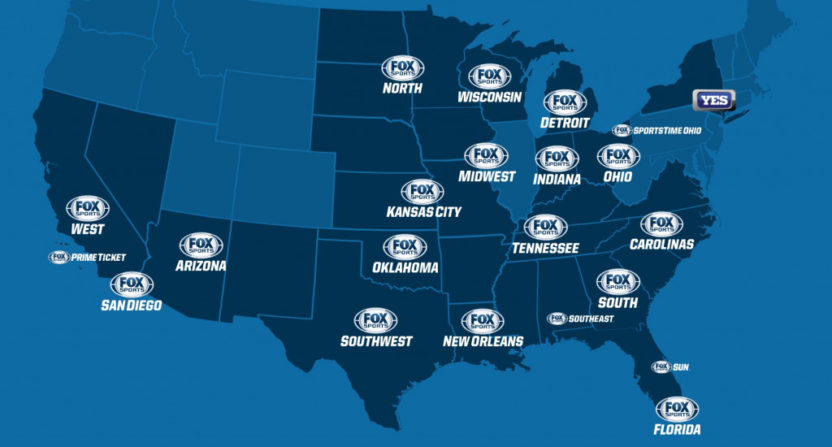The most notable sports angle of Disney buying numerous 21st Century Fox assets involves Fox’s 22 regional sports networks, which Disney has agreed to sell off to gain Department of Justice approval for the deal. There are plenty of potential buyers out there, and the numbers of buyers only increase if Disney agrees to sell the RSNs off in smaller packages instead of selling all 22 to one entity. (Also, there’s still a chance of Comcast outbidding Disney for the whole Fox package and having their bid accepted, but they would probably also have to agree to sell the RSNs given the DOJ case here.) Plugged-in sports media reporter John Ourand of Sports Business Journal told SBJ executive editor Abe Madkour on SBJ’s Morning Buzzcast podcast Wednesday that he thinks a piecemeal deal is a possibility, and that numerous large players could be involved there, including agencies like Endeavor (WME-IMG) and CAA:
“They could sell them off piecemeal,” Ourand said. “Comcast wants the ones in its markets, AT&T wants the ones in its markets. Some distributors, like Charter, already have said that they’re interested in doing it. Venture capital could be out there looking at it, and then you have these deep-pocketed companies like Endeavor and CAA that have been looking to get into the media, that have been consistently building out their media groups. So I think there’s going to be a long line of people that are kicking the tires on these RSNs.”
It’s notable that all those companies already have a presence in the RSN market. Comcast has seven RSNs (and an eight percent stake in an eighth, SNY), AT&T has three (plus a 40 percent stake in Root Sports Northwest), and Charter has five (although one, Spectrum Sports Wisconsin, is extremely, extremely local). So there could potentially be some antitrust concerns for any of them. However, picking up a few RSNs here and there is probably less concerning for regulators than if one company bought all of these.
Tech companies could perhaps get involved as well. YouTube has already done that with their efforts in the LA market, including grabbing LAFC local rights, and they and other tech firms could be players here. But Ourand said he thinks while they may show some interest, they’re unlikely to be outright buying RSNs at this point.
“I think it’s unlikely right now, I think we’re a few years ahead of that, but they’re certainly going to be kicking the tires.”
Ourand also said that the destination for one particular network, the biggest one, appears clear, though. As we’ve previously discussed, the New York Yankees have the option to buy back majority control of YES at a market rate (likely over $4 billion), and they’ve reportedly been considering that. Ourand said they’re all but certain to exercise that option, and they likely would have done so even if Disney wasn’t forced to divest the RSNs.
“Expect the Yankees to take back ownership of the YES Network,” he said. “Even if Disney kept them, they almost certainly would have exercised that.”
Despite the possible bidders in play, Ourand said there seems to be less priority on RSNs (presumably because of Disney deciding they’re willing to part with them instead of fighting the DOJ in court) than some might have expected recently.
“It’s really an amazing turnaround. Nobody seems to want these RSNs, Abe. This business has been one of the biggest profit drivers for Comcast and 21st Century Fox for years, but it’s plainly obvious that the same problems that are affecting ESPN, shrinking subscriber base, higher rights fees, they’re hitting RSNs as well. …It’s just surprising to me that they’re not as popular as they’ve seemed to be the last couple of years”
He cited NBC Sports Chicago as an example of that.
“You’re seeing this happen in Chicago right now. Comcast is losing subscribers in Chicago, but they’re having to renew rights fees in negotiations with all four teams, and all four teams want a lot more money, because they’re seeing teams across the country get a lot more money, and Comcast doesn’t even really have that money, because they’re losing subscribers. The whole business is changing.”
While RSNs may not be as valuable as they’d seemed a few years back, they’re still pretty profitable, with Barclays analyst Kannan Venkateshwar estimating an annual revenue of $2 billion and a likely sale price around $20 billion for the RSNs overall (as per Ben Munson of Fierce Cable). And it doesn’t seem quite right to presume that Disney doesn’t want these networks; from this corner, it seems more like they’re willing to give them up to gain regulatory approval for the acquisition of other Fox assets, but they probably would have been quite happy to have them (especially considering the potential synergies with ESPN) if the DOJ hadn’t stepped in. But in any case, there are certainly some challenges for RSNs as cord-cutting expands, and that may be reflected in this sale. It still looks like there will be plenty of parties vying for them, though, so it will be interesting to see where they land.
